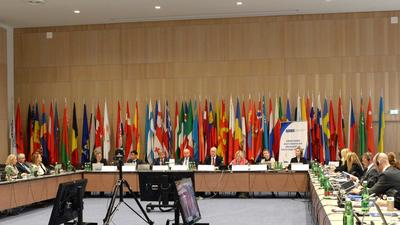-
Our work
-
Fields of work
- Arms control
- Border management
- Combating trafficking in human beings
- Conflict prevention and resolution
- Countering terrorism
- Cyber/ICT Security
- Democratization
- Economic activities
- Education
- Elections
- Environmental activities
- Gender equality
- Good governance
- Human rights
- Media freedom and development
- Migration
- National minority issues
- Policing
- Reform and co-operation in the security sector
- Roma and Sinti
- Rule of law
- Tolerance and non-discrimination
- Youth
- Field operations
- Projects
-
Meetings and conferences
- Summit meetings
- Review Conferences
- Ministerial Council meetings
- Plenary meetings of the Permanent Council
- Plenary Meetings of the Forum for Security Co-operation
- Security Review Conferences
- Annual Implementation Assessment Meetings
- Economic and Environmental Forum
- Economic and Environmental Dimension Implementation Meetings
- Human rights meetings
- Media conferences
- Cyber/ICT security conferences
- Conference of the Alliance against Trafficking in Persons
- Gender equality conferences
- Annual OSCE Mediterranean conferences
- Annual OSCE Asian conferences
- Partnerships
-
Fields of work
-
Countries
- All
-
Participating States
- Albania
- Andorra
- Armenia
- Austria
- Azerbaijan
- Belgium
- Belarus
- Bosnia and Herzegovina
- Bulgaria
- Canada
- Croatia
- Cyprus
- Czechia
- Denmark
- Estonia
- Finland
- France
- Georgia
- Germany
- Greece
- Holy See
- Hungary
- Iceland
- Ireland
- Italy
- Kazakhstan
- Kyrgyzstan
- Latvia
- Liechtenstein
- Lithuania
- Luxembourg
- Malta
- Moldova
- Monaco
- Mongolia
- Montenegro
- The Netherlands
- North Macedonia
- Norway
- Poland
- Portugal
- Romania
- Russian Federation
- San Marino
- Serbia
- Slovakia
- Slovenia
- Spain
- Sweden
- Switzerland – OSCE Chairpersonship 2026
- Tajikistan
- Türkiye
- Turkmenistan
- Ukraine
- United Kingdom
- United States of America
- Uzbekistan
- Asian Partners for Co-operation
- Mediterranean Partners for Co-operation
-
Structures and institutions
- Chairpersonship
-
Secretariat
- Secretary General
- Office of the Secretary General
- Conflict Prevention Centre
- Transnational Threats Department
- Office of the Special Representative and Co-ordinator for Combating Trafficking in Human Beings
- Office of the Co-ordinator of OSCE Economic and Environmental Activities
- Gender Issues Programme
- Opportunities for Youth
- Department of Human Resources
- Department of Management and Finance
- Office of Internal Oversight
- Documentation Centre in Prague
- Institutions
-
Field operations
- Presence in Albania
- Centre in Ashgabat
- Programme Office in Astana
- Programme Office in Bishkek
- Mission to Bosnia and Herzegovina
- Programme Office in Dushanbe
- Mission in Kosovo
- Mission to Moldova
- Mission to Montenegro
- Mission to Serbia
- Mission to Skopje
- Project Co-ordinator in Uzbekistan
- Closed field activities
- Parliamentary Assembly
- Court of Conciliation and Arbitration
- Organizational structure
- About us
News Item
OSCE launches report on role of financial literacy in youth crime prevention
The results of a new OSCE study on financial literacy were presented to 80 international policymakers and criminal justice practitioners at a side event during an OSCE Security Committee meeting in Vienna on 10 April. The study, “From Risk to Resilience: The Role of Financial Literacy in Youth Crime Prevention”, was presented by the OSCE Transnational Threats Department and the Office of the Co-ordinator of OSCE Economic and Environmental Activities.

- Issued on:
- Issued by:
- OSCE Secretariat, Office of the Co-ordinator of OSCE Economic and Environmental Activities, Transnational Threats Department
- Fields of work:
- Policing, Economic activities
The results of a new OSCE study on financial literacy were presented to 80 international policymakers and criminal justice practitioners at a side event during an OSCE Security Committee meeting in Vienna on 10 April. The study, “From Risk to Resilience: The Role of Financial Literacy in Youth Crime Prevention”, was presented by the OSCE Transnational Threats Department and the Office of the Co-ordinator of OSCE Economic and Environmental Activities.
A key finding of the study is that a lack of financial literacy makes youth more vulnerable to recruitment into organized crime. Exposure to debt traps, family financial stress and ‘quick money’ scams on social media further contribute to this susceptibility. Increasing financial literacy can serve as a prevention tool because educating young people about debt traps and financial scams fosters resilience to exploitation and promotes financial independence outside of criminality.
The study report emphasizes the need for a comprehensive approach to youth crime prevention including financial education, particularly through partnerships with educational institutions, social services, civil society and the private sector. It also highlights good practices in structuring and implementing these partnerships.
“We must acknowledge that young people should not only be protected from crime, but engaged and empowered as active partners in shaping crime prevention policies. Their voices are essential to crafting more effective and forward-looking approaches to security,” said Santeri Leinonen, Special Representative of the OSCE Chairperson-in-Office on Youth, Peace and Security, “With its strong presence on the ground through its network of field operations and its comprehensive approach to security, the OSCE is uniquely positioned to tackle the complex issue of youth recruitment into organized crime. The OSCE’s expertise in building partnerships and fostering cross-sector collaboration is instrumental in delivering impactful crime prevention strategies.”
The event was organized in co-operation with the 2025 OSCE Chairpersonship of Finland and this year's Chair of the OSCE Security Committee, the United Kingdom. It is part of the OSCE-wide multi-year project “Enhancing youth crime and drug use prevention through education on legality and awareness campaigns addressing threats of organized crime and corruption” and was funded by Germany, Italy and Norway. Other donors supporting this project are Andorra, Finland and Poland.